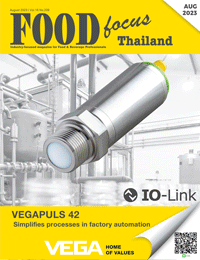“สุขลักษณะส่วนบุคคลของพนักงาน” คือ ปัจจัยพื้นฐานในการผลิตอาหารที่มีคุณภาพ “Personal Hygiene” is the Fundamental Issue in Quality Food Production
3622 Views |

By: อุทาร สัตยารักษ์
Utharn Satayaraks
Managing Director
Prudential Ampri (Thailand) Co., Ltd.
utharn@pat-cleanroom.com
สุขลักษณะส่วนบุคคลของผู้ปฏิบัติงานถือเป็นเรื่องพื้นฐานด้านความปลอดภัยที่โรงงานต้องมีการเน้นย้ำและฝึกอบรมพนักงานอย่างสม่ำเสมอ โดยมักพบว่าการปนเปื้อนในผลิตภัณฑ์อาหารส่วนหนึ่งมาจากพนักงานที่สัมผัสกับอาหารและทำงานในไลน์การผลิต เช่น ฝุ่น สิ่งแปลกปลอม เส้นขนและเส้นผม เป็นต้น ซึ่งชุดปฏิบัติงานของพนักงานที่ได้รับการออกแบบอย่างเหมาะสม จะมีส่วนช่วยป้องกันการปนเปื้อนเบื้องต้นจากพนักงานสู่อาหารได้ในอีกทางหนึ่งด้วย หลักการจัดการชุดปฏิบัติงานให้สอดคล้องตามข้อกำหนดของ Good Hygiene Practices (GHP) มีดังต่อไปนี้
- ชุดปฏิบัติงานของพนักงานในไลน์ผลิต: ต้องได้รับการออกแบบเฉพาะและมีขนาดที่เหมาะสมกับแต่ละบุคคล เพื่อความสะดวกในการปฏิบัติงาน โดยควรเลือกใช้เนื้อผ้าที่มีคุณสมบัติพิเศษที่ไม่ก่อให้เกิดการปนเปื้อนลงสู่ผลิตภัณฑ์อาหาร รวมถึงไม่ส่งผลกระทบต่อสุขภาพของพนักงาน เช่น เนื้อผ้าที่ไม่ก่อให้เกิดฝุ่น (Lint-free) เนื้อผ้าที่ลดการเกาะติดของฝุ่น (Anti-static) และสามารถกรองฝุ่นได้ (Dust-filler) เพื่อป้องกันฝุ่นหรือเส้นใยจากเนื้อผ้าที่อาจปนเปื้อนลงสู่ผลิตภัณฑ์อาหาร โดยสามารถเลือกใช้เนื้อผ้าที่มีคุณสมบัติในการสะท้อนน้ำ เพื่อให้ง่ายต่อการรักษาความสะอาด เป็นต้น ส่วนหมวกที่ใช้คลุมผมต้องเป็นหมวกเฉพาะทางที่มีคุณสมบัติในการรวบเส้นผมหรือขนคิ้วได้อย่างมิดชิด เพื่อป้องกันไม่ให้เส้นผมหรือขนคิ้วหลุดร่วงลงสู่ผลิตภัณฑ์
- ระบบซักอบรีดในโรงงาน: โรงงานผลิตอาหารต้องมีมาตรฐานการซักอบรีดชุดปฏิบัติงานของพนักงานในไลน์ผลิต โดยต้องมีการเลือกใช้สารซักฟอกที่เหมาะสมต่อการใช้ในอุตสาหกรรมอาหาร เพื่อให้ชุดปฏิบัติงาน สะอาด ปลอดภัยต่อผู้สวมใส่และพร้อมที่จะใช้งานต่อไป
- การตรวจสอบยืนยันความสะอาดและประสิทธิภาพของกระบวนการซัก: พนักงานควบคุมคุณภาพควรมีการตรวจสอบความสะอาดของชุดปฏิบัติงานอยู่เสมอ รวมถึงทวนสอบเพื่อยืนยันประสิทธิภาพของกระบวนการซัก ไม่ว่าจะเป็นการซักจากภายในโรงงานเองหรือจากผู้รับจ้างภายนอกที่ได้รับอนุญาต
- การฝึกอบรมพนักงาน: บริษัทฯ ต้องมีการจัดการฝึกอบรมพนักงานเกี่ยวกับข้อควรปฏิบัติด้านสุขลักษณะส่วนบุคคล เพื่อสื่อสารให้พนักงานได้รับทราบถึงวิธีการแต่งกายและการดูแลรักษาชุดปฏิบัติงานอย่างถูกต้อง รวมถึงควรยกเอาประเด็นปัญหาที่เกี่ยวข้องกับการปนเปื้อนจากพนักงานมาใช้เป็นกรณีศึกษาในการฝึกอบรมพนักงานด้วย
Personal hygiene is a fundamental aspect of safety that manufacturers must emphasize, and employees must be trained regularly. The potential for contamination is a hazard that is mostly unique to the food processing industry, and it is often contaminated by employees working in the production lines, such as dust, foreign matter, hair, etc. The proper worker's clothes specifically designed can reduce the potential for contamination. The principles requirements of working apparel according to the Good Hygiene Practices (GHP) are as follow.
- Workers' Uniforms: They must be designed and suitably sized for each operator to work comfortably. The workers' clothes should be produced from unique fabrics that do not cause contamination of food products, including not affecting their health; for example, lint-free, anti-static, and dust filters to prevent dust or fibers from the fabric from contamination in food products. In addition, materials with water-reflection properties that are easy to clean and maintain hygiene should be considered. The hood used to cover workers' hair must be a specialized hood that can gather hair or eyebrows completely to prevent hair or eyebrows from falling into the product.
- Laundry system in the factory: Food factories must have laundry standards for workers' clothes—appropriate detergent in the food industry must be carefully selected to keep the clothes clean, safe, and ready to use.
- Verification of the cleanliness and efficiency of the laundry process: Inspectors should always check the cleanliness of work clothes, including verification to confirm the efficiency of the laundry process either inside the factory or by permitted external providers.
- Employee training: The company must organize training sessions on personal hygiene practices to communicate well with employees on how to wear and maintain uniforms correctly. The case studies of contamination from workers into food products that happened in the factories should be one of the topics in each training session.






